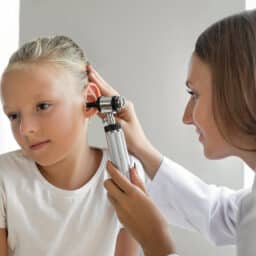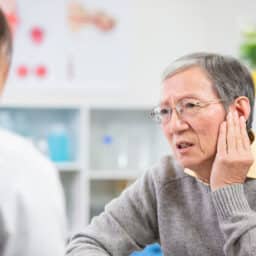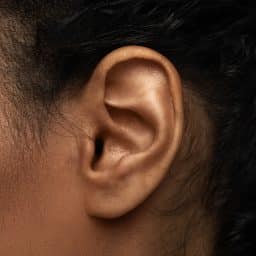What To Know About Tympanosclerosis

Tympanosclerosis is a condition stemming from inflammation of the tympanic membrane, commonly known as the eardrum, along with the middle ear. This condition may lead to hearing loss or, in some cases, manifest no symptoms at all. There are various causes of tympanosclerosis, and the cause will determine the course of treatment. Symptoms and Potential…
How Are Stress and Hearing Loss Connected?

We often hear about the widespread effects of stress on our health, but one area that tends to go unnoticed is its impact on our hearing health. Chronic stress doesn’t just affect your mood or heart; it can also have a surprising effect on your ears. How Stress Affects Hearing Our inner ear contains tiny…
What Does A Lump Behind My Ear Mean?

When you find a lump behind your ear, it’s often not a cause for immediate alarm. These lumps can have various origins and may sometimes disappear without any intervention. Let’s delve deeper to understand the potential causes of these lumps and when it might be essential to seek medical attention. What Could Be Causing That…
What To Expect From An Ear Tube Procedure

An ear tube procedure is a common surgical procedure in children designed to address middle ear infections. If your child is scheduled for this procedure, understanding what to anticipate will help alleviate many of your concerns and provide the right support for your child. Surgery Overview The placement of an ear tube becomes necessary when…
How to Care For Your ENT Concerns When Traveling

The holidays are filled with travel. Whether you’re driving, flying or boarding a bus or train, cold and flu germs will likely be companions to at least one of your transportation’s passengers. Learning how to safeguard your ear, nose and throat (ENT) health during travel is essential in preventing sneezing and coughing from taking part…
How To Manage Hearing Loss During Holiday Work Parties

The holiday season can bring joy, festivities and an array of social gatherings, including holiday work parties. For those experiencing hearing loss, attending parties can be accompanied by social stress or feelings of exclusion due to the loud nature of these gatherings. With 28.8 million adults potentially benefitting from hearing aids, taking proactive steps can…
How to Choose Safe Headphones

Young people often spend leisure time listening to unsafe levels of music on their personal devices, creating an emerging public health problem. The amount of time spent on personal devices makes selecting appropriate headphones and volume levels even more important. It’s still possible to enjoy time on personal devices at Squires Park safely, so consider…
What Are the Common Causes of a Perforated Eardrum

A perforated eardrum is a hole or tear in the eardrum. Symptoms of a perforated eardrum may include ear pain, fluid drainage from the ear, hearing loss, tinnitus, vertigo and nausea or vomiting. Your ear, nose and throat (ENT) specialist will usually identify a perforated eardrum through a visual inspection using an otoscope. Your specialist…
What Are the Best Types of Earplugs for Preventing Swimmer’s Ear?

One of the best ways to escape the heat this summer is to go for a swim. However, one consequence of swimming, especially for children with pre-existing ear issues, is an infection known as swimmer’s ear. Swimmer’s ear happens when water gets trapped in the ear, and bacteria grow, infecting the outer ear canal. Certain…
What Does the Color of Your Earwax Mean?

Our earwax plays an important role in the health of your ear. Not only does it lubricate the ear canal to prevent the skin from drying out and becoming irritated, it also traps debris and germs. Unfortunately, many people mistakenly believe it needs to be removed. This isn’t true. According to an article published in…